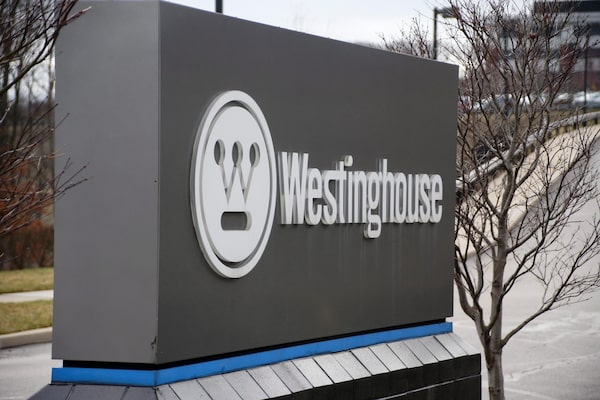
Cameco Corp. and Brookfield Asset Management Inc.’s renewables company will acquire nuclear company Westinghouse Electric Co. for US$4.5-billion plus more than US$3-billion in assumed debt.Keith Srakocic/The Associated Press
Persistent inflation and slowing global economic growth are hitting Brookfield’s private equity business, and investor sentiment is deteriorating so rapidly that it will take much more than the division’s stellar return on its Westinghouse sale to eliminate its massive market discount.
Spun out from parent company Brookfield Asset Management BAM-A-T in 2016, Brookfield Business Partners LP invests in and runs what the company calls “business services and industrial operations.” It is generally seen as Brookfield’s private equity arm and its holdings are quite diverse, ranging from a car battery manufacturer, to an Australian private hospital operator, to Genworth MI, Canada’s largest private mortgage insurer, which is now called Sagen.
On Tuesday, Brookfield Business announced the sale of nuclear power company Westinghouse, another of its investments, to a joint venture group that includes a different Brookfield division, as well as Canadian uranium producer Cameco Corp. CCO-T, for US$4.5-billion plus more than US$3-billion worth of debt. The return is the stuff private equity firms dream of: Brookfield Business made about six times its original investment in August, 2018, and the company’s stock jumped 7.2 per cent Wednesday in New York.
Nuclear energy is making a comeback. What’s happening in Canada and abroad
Brookfield Renewable is buying two clean power companies for about $1.54-billion
Yet it isn’t enough to fully restore investor confidence. Brookfield Business’ stock is still down 33 per cent this year – and it is only marginally positive over the last five years, gaining 4 per cent since October, 2017. Brookfield Infrastructure, meanwhile, has climbed 27 per cent over the same period, while Brookfield Renewable has jumped 53 per cent.
Investors are so timid about Brookfield’s private equity prospects that before the Westinghouse sale was announced, the stock has traded around a 35-per-cent to 40-per-cent discount to its net asset value, according to analyst estimates.
There are multiple reasons for this. “Private equity firms are staring down the barrel at a multitude of threats, including elevated inflation and wage growth, rising interest rates, and the looming risk of a recession on the horizon,” CIBC World Markets analyst Nik Priebe wrote in a note to clients this summer. Rising interest rates make it harder to fund private equity deals, and rocky equity markets make it tough for Brookfield and its rivals to unload their investments through initial public offerings.
Brookfield Business Partners is also a pure-play private equity vehicle, whereas U.S. rivals such as Blackstone and Apollo have built additional units that include real estate and credit. These divisions are factored into their valuations, and they help to keep the shares afloat. Canadian rival Onex Corp. ONEX-T, meanwhile, has traditionally been more of a traditional private equity vehicle and its shares have also struggled, falling 35 per cent over the last five years.
But more than anything, investors just aren’t having it. No one seems to know what the global business environment will look in the next six months to two years, and at the same time, Brookfield Business’ buyouts are largely funded with debt. Rising interest rates will make this debt more expensive, and that will eat into each investment’s profit.
Brookfield Business is well aware of this sentiment and at an investor day in late September, management tried to address the perceived threats. To start, the company is pivoting away from highly cyclical businesses to larger, more stable investments that generate relatively stable cash flows. As for debt concerns, the company disclosed that its weighted average borrowing cost is about 5 per cent, with half of it fixed or hedged. Every 75-basis-point increase in interest rates raises its interest expense by about $US65-million, which management says is less than 5 per cent of adjusted earnings from operations.
Brookfield Business also plans on focusing on two industries in the near-term: health care and technology. Private health care spending is expected to growth at three times the rate of U.S. gross domestic product, partly because the sector has delayed so many services, such as elective procedures, and a number of mature tech companies have seen their valuations hit by the broad sector selloff even though they produce sizable cash flows.
“It really is a tale of two cities and not all technology is created equal,” Brookfield managing partner Anuj Ranjan said during the investor day. “You have your high-growth, non-profitable tech where valuations, even after coming off, are still incredibly high. But with that are actually great businesses that are profitable, cash-generating, high-quality technology services and software companies that trade at much more reasonable multiples.” Brookfield likes the latter. The company declined to comment for this story.
The strategy – and the Westinghouse sale price – is encouraging for many analysts. “We came away from the presentation with increased conviction on Brookfield Business’s positioning and investment opportunities in an uncertain environment,” Scotia Capital analyst Phil Hardie wrote in a note to clients after the investor day.
But being calm and rational is hard for investors in these turbulent times.
 Tim Kiladze
Tim Kiladze